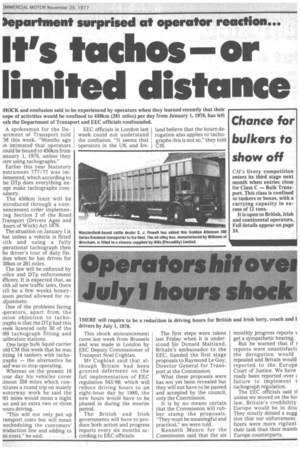tachos or limited distance
Page 5

If you've noticed an error in this article please click here to report it so we can fix it.
'HOCK and confusion said to be experienced by operators when they learned recently that their cope of activities would be confined to 450km (281 miles) per day from January 1, 1978, has left ioth the Department of Transport and EEC officials confounded A spokesman for the Deartment of Transport told :M this week. "Months ago re intimated that operators rould be bound to 450km from anuary 1, 1978, unless they Jere using tachographs."
Earlier this year Statutory nstrument 777/77 was im.1emented, which according to he DTp does everything ex:ept make tachographs corntulsory.
The 450km limit will be ntroduced through a comnencement order implemen.ing Section 2 of the Road, fransport (Drivers Ages and -lours of Work) Act 1976.
The situation on January 1 is hat unless a vehicle is fitted rith and using a fully iperational tachograph then he driver's tour of duty fin;hes when he has driven for 50km or 281 miles.
The law will be enforced by iolice and Dip enforcement Ifficers. It is expected that, as vith all new traffic laws, there vill be a few weeks honeynoon period allowed for re.djustment.
One of the problems facing operators, apart from the mion objection to tacho;raphs is that the DTp had this veek licenced only 30 of the 00 tachograph fitting and !alibration stations.
One large bulk liquid carrier old CM this week that he was itting 14 tankers with tacho;raphs — the alternative he aid was to stop operating.
Whereas on the present 10 tour day his vehicles cover ilmost 350 miles which con;titutes a round trip on mainly notorway work he said the 81 miles would mean a night iut and an extra two or three tours driving.
"This will not only put up ransport costs but will mean .escheduling the customers' troduction line and adding to tis costs," he said. EEC officials in London last week could not understand the confusion. "It seems that operators in the UK and Ire This shock announcement came last week from Brussels and was made in London by EEC Deputy Commissioner of Transport Noel Coghlan.
Mr Coghlan said that although Britain had been granted deferment on the full implementation of EEC regulation 543/69, which will 'reduce driving hours to an eight-hour day by 1980, the new hours would have to be phased in during the interim period.
The British and Irish governments will have to produce both action and progress reports every six months according to EEC officials. land believe that the hours derogation also applies to tachographs this is not so," they told CM.
The first steps were taken last Friday when it is understood Sir Donald Maitland, Britain's ambassador to the EEC, handed the first stage proposals to Raymond Le Goy, Director General for Transport at the Commission.
What these proposals were has not yet been revealed but they will not have to be passed and accepted by the council, only the Commission.
It is by no means certain that the Commission will rubber stamp the proposals. "They must be meaningful and practical," we were told.
Kenneth Munro for the Commission said that the six monthly progress reports v get a sympathetic hearing.
But he warned that if t reports were unsatisfactc the derogation would repealed and Britain would reported to the Europe Court of Justice. We have ready been reported over failure to implement t tachograph regulation.
The EEC officials said tl unless we moved on the hoi law, Britain's credibility Europe would be in dou They stoutly denied a sugg tion that our enforcement ficers were more vigilant their task than their mainle Europe counterparts.










































































































